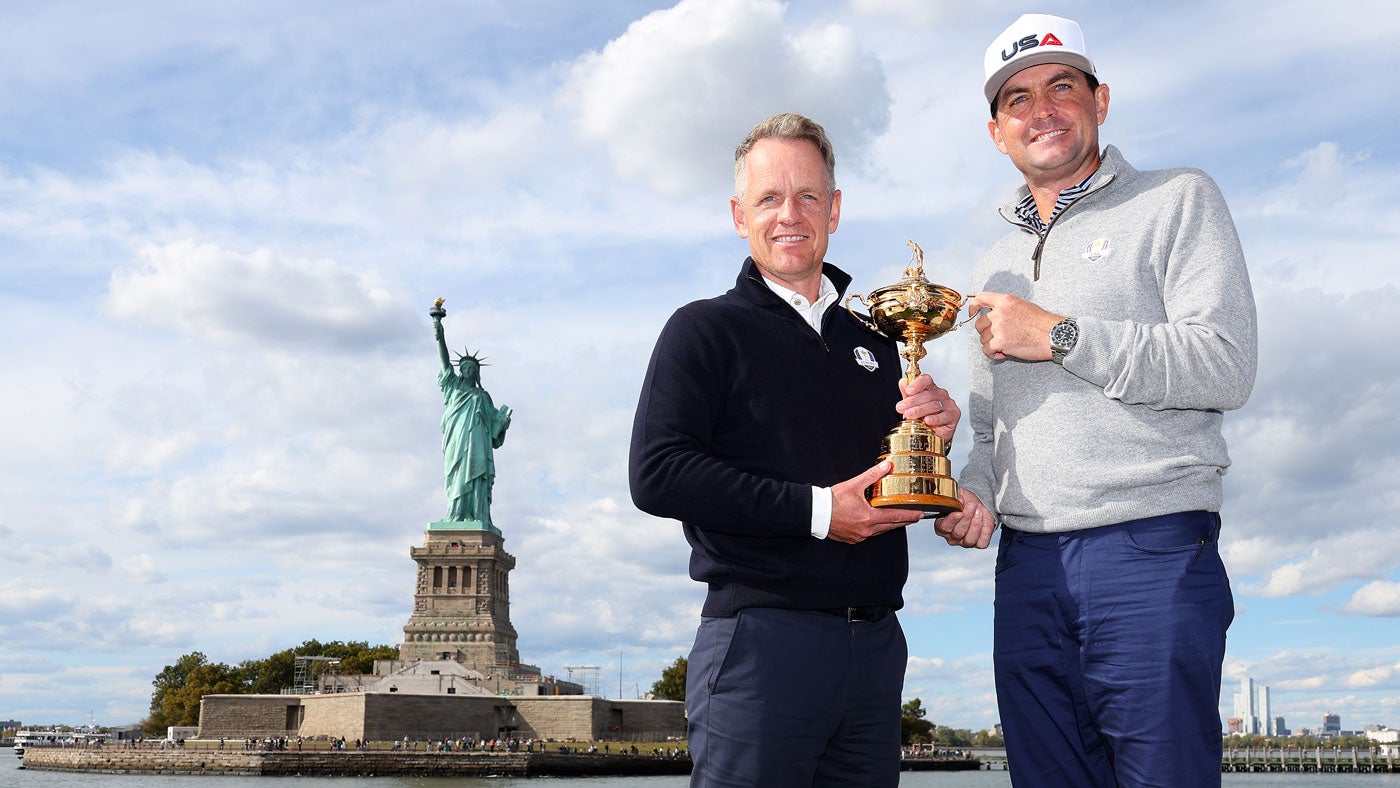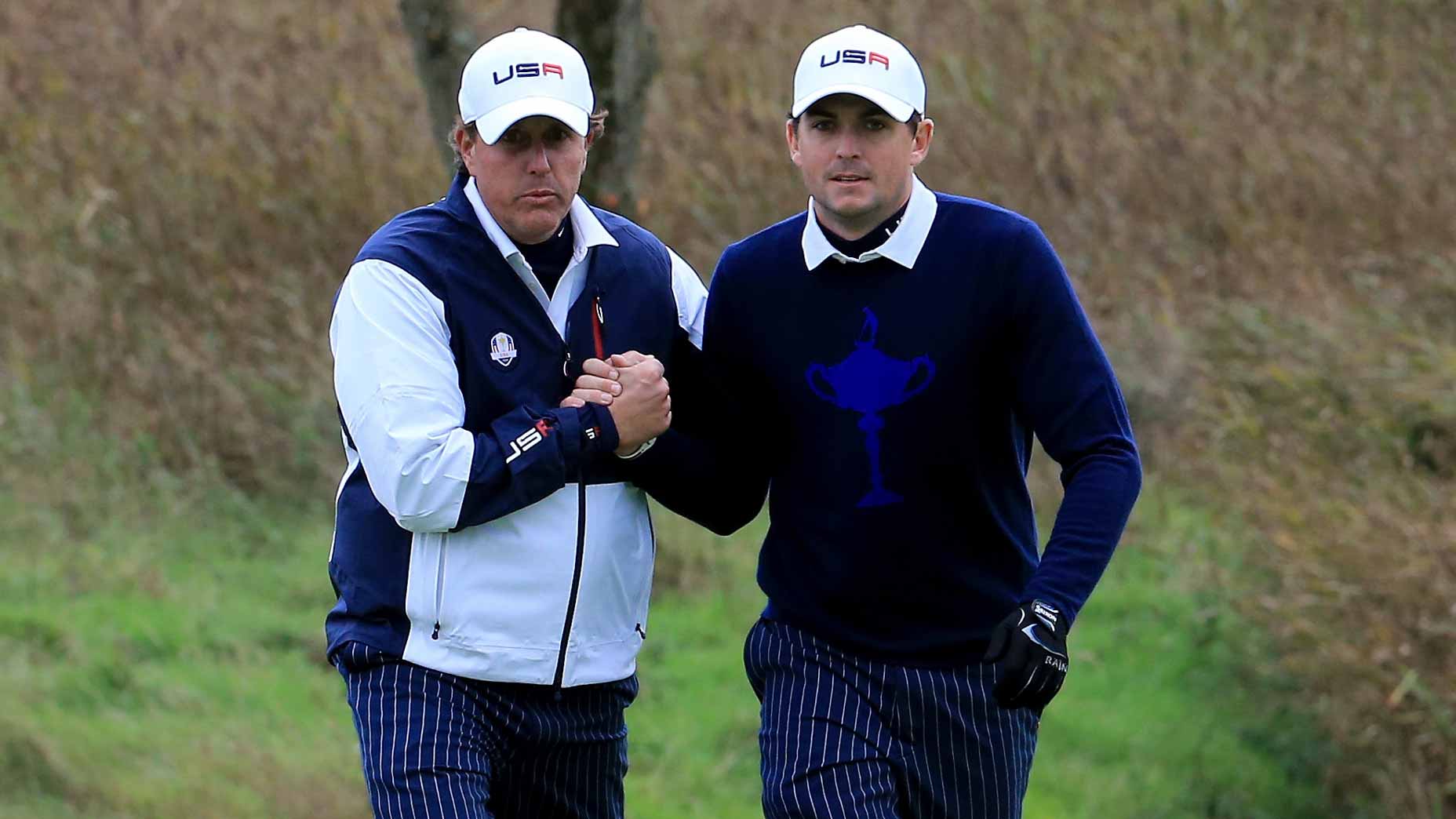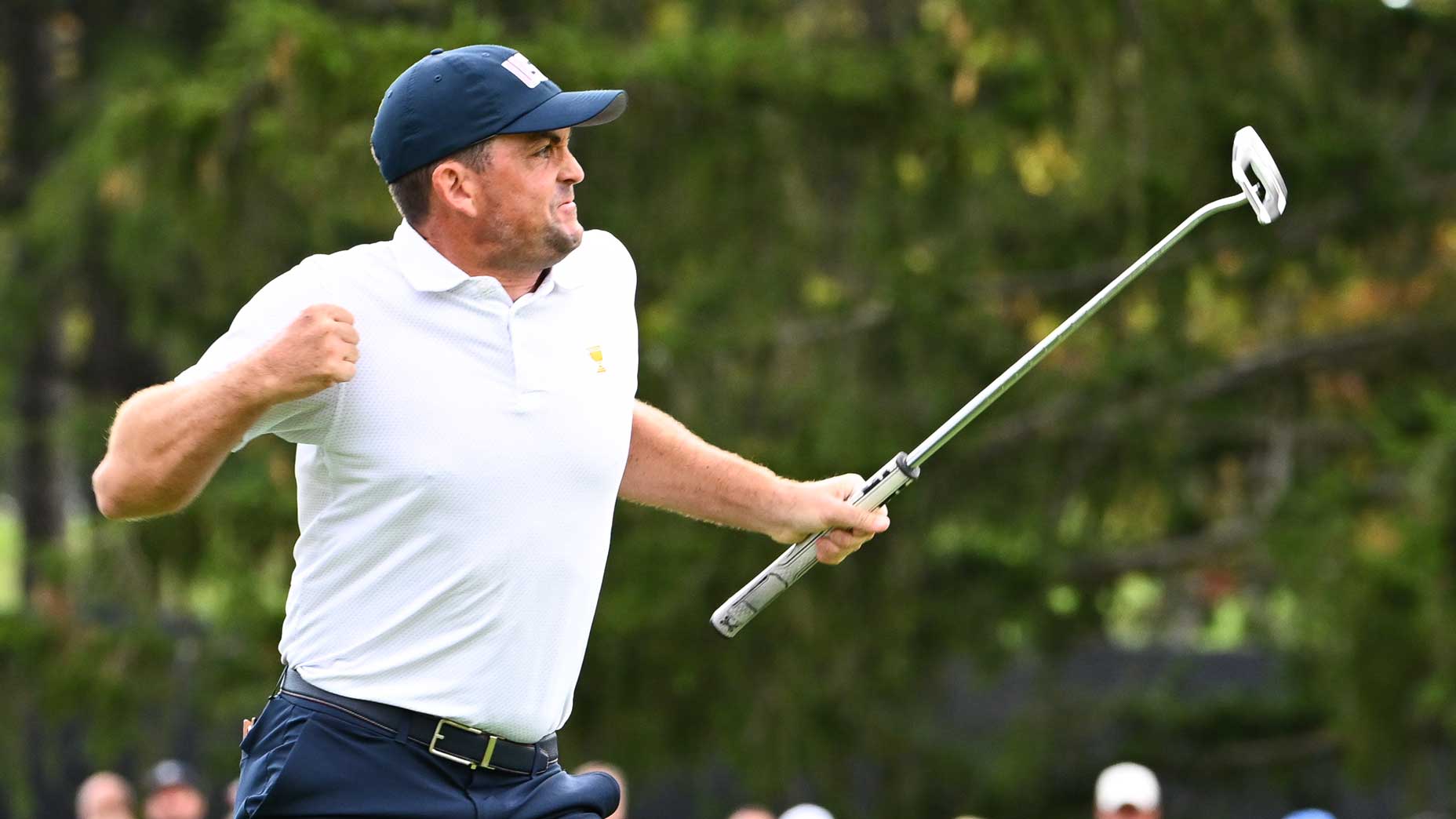Luke Donald, left, and Keegan Bradley in New York City on Monday.
getty images
NEW YORK — If there were any lingering questions as to how big the Ryder Cup has become, they were settled in Midtown Manhattan Monday morning when the 2025 captains, Keegan Bradley (U.S. of A.) and Luke Donald (Europe), sat for a press conference in front of nearly 400 onlookers, most of whom weren’t even members of the media.
Filling the seats in a glass-backed auditorium at the New York Times’ headquarters were assorted PGA of America and DP World Tour officials; other associates and friends of the PGA of America; Bradley’s former college coach at St. John’s, Frank Darby; the newly appointed U.S. team manager, John Wood; and a smattering of mostly New York-area reporters. It was a packed house, never mind that the next Ryder Cup, slated for Bethpage Black, about 35 miles due east of here, is still 355 days away.
But this is what the Ryder Cup has become: hyper-charged, deeply anticipated and hugely profitable, lining the pockets not only of its organizing bodies but also the cities that play host to the biennial event. The 2023 Ryder Cup in Rome attracted more than 270,000 fans from 100 countries to Marco Simone Golf and Country Club, a population surge that drove nearly $300,000 million in economic activity to greater Rome, according to an independent financial analysis of the event. Rome is a big market, but the Big Apple is even bigger. The 2025 Ryder Cup is certain to be a cash cow, media frenzy and, if previous big-ticket tournaments at Bethpage Black are any indication, the loudest, rowdiest Ryder Cup in history. There’s just something about the Black course that gets New Yorkers going.
“You ask any New Yorker, they are so proud of Bethpage Black,” Bradley said from the stage Monday, Donald seated to his left. “This is their course. We have incredible courses in the area — Winged Foot, Shinnecock — but the real New Yorkers, they talk about Bethpage. They all have a story of playing with their dad, with waiting in line in their car and going out and playing Bethpage Black, and that’s an extremely important thing for our team. We love Bethpage Black. We know how important it is to New Yorkers, and we are going to go out there and love every second of it.”
Bradley is as familiar with the Black course as just about anybody in the upper ranks of professional golf, which is in part how he landed the surprise captaincy. As a student-golfer at St. John’s University in Queens, he and his teammates would frequent the daunting A.W. Tillinghast course after their other golfing haunts had closed for the winter. With a wink and a pass from the superintendent, they’d play only holes 3 through 14, which sit on the other side of a road that bisects the course, away from suspicious eyes. In those days, Bradley surely could never have imagined that he’d one day skipper a U.S. Ryder Cup team on this very course, no less at the tender age of 39, when he would still be at or near the prime of his career.
When Bradley was matriculating at St. John’s, only one major championship had been conducted at the Black course: the 2002 U.S. Open. But those four June days were all that was required to reveal to the golf world that Bethpage isn’t your typical Tour venue. The roars from the well-oiled galleries left your ears ringing and spine tingling; at one point Phil Mickelson had to back away from a putt on the 14th green on account of chants of adoration from a tee box on the other side of the road, 100 yards away. Heckling also was common, with cheeky fans relentlessly chirping Sergio Garcia both for his fidgetiness and famous girlfriend, tennis star Martina Hingis.
The Black has since hosted two more boisterous majors, the 2009 U.S. Open and 2019 PGA Championship, as well as a pair of FedEx Cup playoff events. But the 2025 Ryder Cup will be on another level; last week’s plans surfaced for a single towering grandstand that will wrap around not only the first tee but also the 18th green. Bring your earmuffs. With the U.S. seeking redemption after a humbling defeat in 2023, the Bethpage fans will be like a pack of feral dogs within sniffing distance of a juicy steak. Will they be uninhibited? Surely. Unruly? Yes, maybe that, too.
Bradley said he has “total faith in the fans of New York to cheer on their team, proudly and loudly” and that he doesn’t want them to “do anything that would affect the course of play.” But at the same time, he said, “It’s going to be a tough atmosphere. It’s going to be tough for both teams. I think Luke would say, you’ve sort of got to be ready for it.”
Security will be monitoring fan behavior from inside the ropes, Bradley said, with the goal of maintaining a fair playing field.
“Nobody on either team wants this to get uncomfortable or weird out there,” he added. “But listen, you come into Yankee Stadium, you come into Madison Square Garden, you come into these places, it’s a tough place to play, and Luke and the boys know that.”
Bradley accepted the captaincy only three months ago; the offer came later than usual for a would-be captain because Tiger Woods couldn’t decide whether he wanted the job. Since Bradley’s appointment, what he has been doing on the course has garnered far more attention than anything he has done off of it. In August, he won a playoff event, the BMW Championship, which helped earn him a captain’s pick from Jim Furyk for this year’s U.S. Presidents Cup team. In that contest, at Royal Montreal last month, Bradley went 2-1-0 in the U.S.’s resounding victory over the Internationals. Bradley’s charge was to win points but he also made sure to glean whatever leadership tactics he could from his captain.
“The second session, we got beat 0-5, which was pretty shocking,” Bradley recalled Monday. “[Furyk] just stuck with the plan. He didn’t panic. Didn’t change the pairings. He kept everything very level. I think that was a time in the tournament where he could have panicked a bit and decided to switch the plan up. It was very clear that he was going to stick with the script and go with what they had figured out before the week started, and I think a lot of the players responded well to that.”
Bradley said he also saw a new side of world No. 1 Scottie Scheffler at the Presidents Cup. Week to week on Tour, Bradley said he’s been reluctant to enter Scheffler’s orbit (“He’s such a hard guy to talk to it tournaments because he’s always winning. So you’re like, ‘I don’t want to bother him’”), but in Montreal, Bradley said he witnessed Scheffler emerge as a leader and font of advice for the younger players.
A year might sound like plenty of time for Bradley to ease into his new role and check all the necessary boxes. It’s not. When you’re at the epicenter of a global sporting event, one decision is quickly followed by another. Team-room setup. Meals. Uniforms. Gala venues. Cart drivers. Not to mention determining who will comprise your team. Assembling a lineup is a months-long process that includes studying players (and their stats), talking with them, texting with them, etc.
Bradley said with his heavy playing schedule this fall he hasn’t yet fully rolled up his sleeves on his captaining duties, but with the clock ticking that process has now begun in earnest. Bradley isn’t alone in his quest. Chief among his stable of advisors and assistants is John Wood, the longtime Tour caddie turned NBC analyst, who in May was named team manager of the U.S. side. When the PGA of America announced Wood’s first-of-its-kind role, the association said he was being tasked with providing “valuable guidance across a variety of team management areas including player selection, recruitment, motivational strategies, logistical coordination and fostering a positive team environment.”
On Monday, Wood, who has caddied in seven Ryder Cups, elaborated on his responsibilites, telling GOLF.com that “the general idea is to maybe eliminate some of the decisions that get all the way to Keegan. If there are eight things you need to choose from, I think I’ve been in enough team rooms and situations to get six of those off the table right away.”
That could mean deciding where to position the Ping-Pong table in the team room, what energy bars should be available at the turn or what belts should grace the players’ waists. The “simple stuff,” as Wood put it.
“The U.S. has always seemed to start from scratch every two years,” he said. “Everything gets decided every two years when there’s so much that should be the same.” Wood’s role, part, is to help streamline those decisions and processes. He said he also is creating a how-to booklet for Ryder Cup novices filled with the basic dos and don’ts of the event. “Just so when new people come in, they know exactly what they need to do,” he said.
Mostly, though, Wood’s job is to free up his captain.
“The great thing about Keegan is he’s so decisive and so clear in his vision for this team that when a decision comes to me from the PGA of America about clothing, about a bag, I know what he wants in this team, and it’s easy for me to say this is what Keegan will want,” Wood said.
Bradley has said he will not use one of his half-dozen captain’s picks on himself but if his form holds, there’s a possibility he could outright qualify for his own team. What then? Bradley will suit up and leave at least some of his captaining duties to Wood and his vice-captains, who thus far include Webb Simpson and Brandt Snedeker. It would be an unusual scenario but also one for which Bradley’s confidantes will be preparing.
“Every vice-captain that I am choosing will know that this is a possibility,” Bradley said. “But again, we’re so far away from that that I’m really focused on being a captain right now.”




